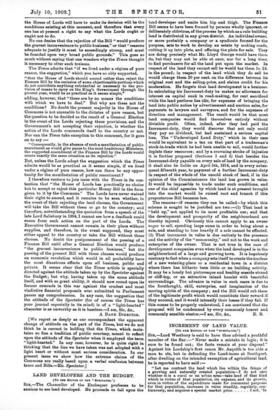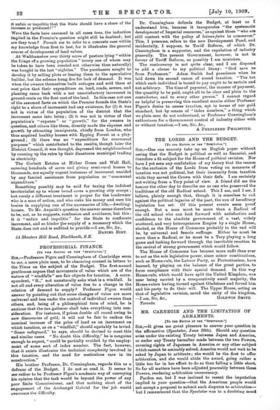INCREMENT OF LAND VALUE. [TO TIM EDITOR OR TILL semarkrote.-]
SIR,—Lord Westbury is said to have thus advised a youthful member of the Bar :—" Never make a mistake in logic ; it is sure to be found out ; the facts remain at your disposal."
Against his Lordship's first canon Mr. Asquith is too able a man to sin, but in defending the Land-taxes at Southport, after dwelling on the intended exemption of agricultural land, he is reported to have said :—
"Let me contrast the land which lies within the fringe of a growing and naturally created population—I do not care whether it is a rural or an urban area—take land of that kind which in virtue of that population, its expanse, and its growth, even in virtue of the expenditure made for communal purposes for that population, increases in value steadily, regularly, con- tinuously, and acquires a special market price I ask, 'Is
it unfair or impolitic that the State should have a share of the increase so produced?'" Were the facts here assumed in all cases true, the induction implied in the Premier's question might still be doubted ; but are they true ? Permit me to refer to a concrete case within my knowledge from first to last, for it illustrates the general course of development of land values.
At Walthamstow over thirty acres of pasture lying "within the fringe of a growing population" (every one of whom may be taken to have been created not otherwise than naturally) was bought in the last "eighties." The purchasers sought to develop it by selling plots or leasing them to the speculative builder, but the scheme hung fire for lack of demand. It was when the owners themselves built cottages and sold them at
cost price that their expenditure on land, roads, sewers, and planting came back with a not unsatisfactory increment in ground-rents on the first cost of the land. In this case not one of the assumed facts on which the Premier founds the State's right to a share of increment had any existence, for (1) it was not in virtue of the population of the district that the increment came into being ; (2) it was not in virtue of that population's " expanse " or "growth," for the .owners in question, and others like them, directly made the expanse and growth by attracting immigrants, chiefly from London, who thus acquired healthy houses with Epping Forest as a play- ground ; (3) there was no "expenditure for communal purposes" which contributed to the results, though later the District Council, it was thought, depressed the neighbourhood by running up the rates by their disastrous municipal trading in electricity.
The Corbett Estates at Hither Green and Well Hall, covering hundreds of acres and giving semi-rural homes to thousands, aro equally cogent instances of increment unaided by any fancied assistance from population or "communal expenditure."
Something possibly may be said for taxing the indolent territorialist up to whose broad acres a growing city creeps ; but surely a different treatment is proper for the landowner who is a man of action, and who risks his money and uses his brains in supplying one of the necessaries of life,—dwelling- houses. To Mr. Asquith's question the answer seems therefore to be, not, as he suggests, confession and avoidance, but this : it is "unfair and impolitic" for the State to confiscate increment, and so hinder the supply of a necessary which the State does not and is unfitted to provide.—I am, Sir, &c, DANIEL BIRT.
54 Shooters Hill Road, Blackheath, S.E.











































 Previous page
Previous page